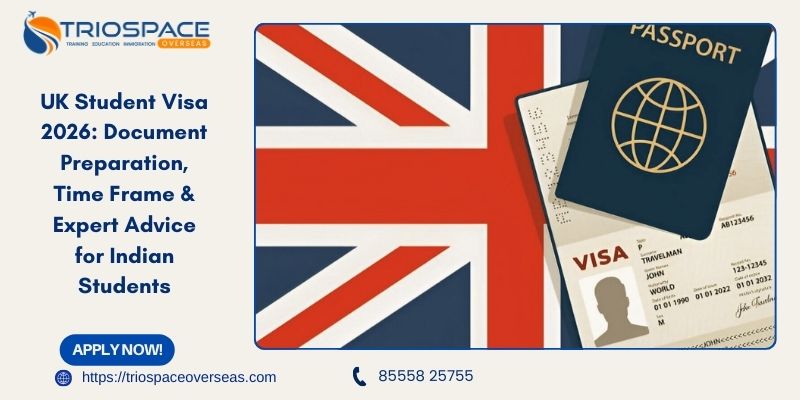
A Comprehensive Guide To Study Abroad in 2024
A comprehensive guide to studying abroad can help you start your international educational journey.
Studying abroad offers numerous benefits, including personal growth, enhanced career prospects, and exposure to diverse cultures. This guide covers crucial aspects, such as selecting the right destination, choosing suitable programs, financial planning, language, and cultural preparation, visa and immigration requirements, accommodation options, and health and safety measures.
It also offers a pre-departure checklist and guidance for adapting to academics and campus life. The guide encourages cultural immersion and exploration while emphasizing the long-lasting impact of the experience on personal and professional development. Studying abroad for Indian students can be a life-changing opportunity, and this guide serves as your roadmap to make the most of it.
Why Study Abroad (Guide to Study Abroad)?
Students study abroad for a multitude of reasons. First and foremost, studying abroad provides exposure to diverse cultures, languages, and perspectives, fostering personal growth and global awareness. Universities in the best countries to study abroad offer top-tier education and innovative teaching methods, enhancing academic and research skills. Pursuing master’s programs abroad allows students to access specialized courses and expert faculty, boosting their career prospects.
Furthermore, studying abroad can significantly broaden professional horizons by providing opportunities for internships and networking. It’s a chance to build an international network and gain a competitive edge in the job market.
The experience of studying abroad also equips students with adaptability, problem-solving skills, and independence, making them well-rounded individuals. These are just some of the compelling reasons why students choose to study abroad, as it is a transformative journey that shapes not only their education but also their future.
Popular Programs for Guide to Study Abroad
Popular programs for studying abroad can vary based on a combination of factors such as personal interests, career goals, and the reputation of the destination country. However, several fields consistently attract international students due to their global demand and potential for career growth. Here are some popular courses to consider when studying abroad:
Business and Management: Programs in fields like finance, marketing, international business, and entrepreneurship are highly sought after for their applicability across industries.
Engineering: Engineering disciplines such as computer science, mechanical engineering, and electrical engineering are in demand globally, offering diverse job opportunities.
Medicine and Healthcare: Courses like medicine, nursing, dentistry, and public health are valued for their potential to make a positive impact on society.
Computer Science and IT: With the digital revolution, computer science, software engineering, and data science programs are in high demand for tech-savvy students.
Natural Sciences: Subjects like physics, chemistry, biology, and environmental science continue to attract students interested in research and exploration.
Social Sciences: Psychology, sociology, and international relations offer insights into human behavior, culture, and global affairs.
Creative Arts: Courses in design, filmmaking, fashion, and the performing arts allow students to nurture their artistic talents and creativity.
Law and Legal Studies: International law, business law, and human rights law are popular choices for those aspiring to work in the legal field.
Architecture and Design: Students interested in shaping the physical world can pursue architecture, interior design, and urban planning programs.
Economics: Economics programs provide a solid foundation for understanding financial markets, policymaking, and global economic trends.
Language and Linguistics: Language courses and linguistics programs are attractive for those passionate about communication and multiculturalism.
Environmental Science: Environmental studies, sustainability, and conservation courses are in demand as the world focuses on ecological concerns.
Top Universities to Studying Abroad
Studying abroad at a top-ranked university can significantly enhance your educational experience and future career prospects. Here is a list of some of the world’s top universities known for their academic excellence and international appeal:
United States (USA):
Harvard University – Located in Cambridge, Massachusetts, Harvard consistently ranks among the world’s top universities and offers a wide range of programs.
Massachusetts Institute of Technology (MIT) – Renowned for its STEM programs, MIT is based in Cambridge, Massachusetts, and is a leader in technology and innovation.
Stanford University – Located in California’s Silicon Valley, Stanford is known for its strong entrepreneurial and technology-focused programs.
California Institute of Technology (Caltech) – Caltech excels in science and engineering and is located in Pasadena, California.
Princeton University – This Ivy League institution, located in New Jersey, is known for its strong academic programs and research opportunities.
United Kingdom (UK):
University of Oxford – Located in Oxford, England, Oxford is one of the world’s oldest and most prestigious universities, offering a wide range of programs.
University of Cambridge – Also located in England, Cambridge is known for its rigorous academics and research excellence.
Imperial College London – Renowned for its STEM programs, Imperial College is located in the heart of London.
London School of Economics and Political Science (LSE) – LSE specializes in social sciences and is located in London.
University College London (UCL) – UCL offers a diverse range of programs and is located in London.
Know more about MBA in UK: Top Business Schools, Courses & Fees
Canada:
University of Toronto – Located in Ontario, the University of Toronto is one of Canada’s top institutions, offering a wide variety of programs.
University of British Columbia – Located in Vancouver, UBC is known for its beautiful campus and academic excellence.
McGill University – Located in Montreal, Quebec, McGill is recognized for its research and diverse student body.
University of Alberta – Located in Edmonton, Alberta, this university is known for its strong science and engineering programs.
University of Waterloo – Located in Ontario, the University of Waterloo is renowned for its co-op programs and technology-focused education.
Australia:
University of Melbourne – Located in Melbourne, Victoria, this university is known for its strong research programs.
University of Sydney – Located in Sydney, New South Wales, it offers a wide range of programs and a vibrant student life.
Australian National University (ANU) – Based in Canberra, ANU is recognized for its research excellence and political science programs.
University of Queensland – Located in Brisbane, Queensland, it is known for its strong science and engineering courses.
University of New South Wales (UNSW) – Located in Sydney, UNSW offers a diverse range of programs and is strong in technology and innovation.
These universities offer a variety of programs and opportunities for international students to pursue their academic and career goals. When considering studying abroad at these institutions, it’s important to research each university’s offerings, location, and admission requirements to make an informed decision.
Cost of Studying Abroad for International Students
The cost of studying abroad for international students can vary significantly based on several factors, including the destination country, the specific university or college, the chosen program of study, and the individual student’s lifestyle. Here’s a breakdown of some of the major expenses that international students typically encounter when studying abroad:
Tuition Fees: Tuition fees vary widely between countries and institutions. In some countries, public universities offer lower tuition rates to international students, while private institutions tend to be more expensive.
Living Costs: This includes accommodation, food, transportation, and other daily expenses. The cost of living varies based on the city and country, with major metropolitan areas generally being more expensive.
Health Insurance: Many countries require international students to have health insurance, either provided by the university or purchased independently.
Visa and Immigration Fees: These fees cover the cost of visa applications and may vary depending on the destination country and the type of visa required.
Books and Supplies: Textbooks and academic materials can add to the overall cost of education.
Language Proficiency Tests: Some countries may require international students to take English language proficiency tests like TOEFL or IELTS, which come with their own fees.
Travel Costs: This includes the cost of airfare to and from the host country.
Student Visa and Residence Permit: The process of obtaining a student visa and residence permit may involve fees for application and renewal.
Miscellaneous Expenses: These may include expenses for extracurricular activities, personal travel, and unforeseen costs.
It’s essential for international students to research the specific costs associated with their intended study destination and institution. Additionally, financial aid, scholarships, and part-time work opportunities can help offset some of these expenses. Many universities also offer scholarships and grants to international students based on academic merit or specific criteria.
Scholarships for Indian Students to Study Abroad
Indian students pursuing international education have access to various types of scholarships to help fund their studies abroad. These scholarships are offered by governments, educational institutions, non-profit organizations, and private foundations. Here are some common types of scholarships for Indian students to study abroad:
Merit-Based Scholarships: These scholarships are awarded based on academic excellence, and they consider factors like high school or undergraduate GPA, standardized test scores (e.g., SAT, GRE, TOEFL, IELTS), and extracurricular achievements.
Need-Based Scholarships: These scholarships take into account a student’s financial need and aim to provide support to those who may not afford the cost of studying abroad.
Country-Specific Scholarships: Some countries and their governments offer scholarships exclusively for Indian students, such as the Commonwealth Scholarships or Fulbright-Nehru Scholarships.
University Scholarships: Many universities and colleges abroad offer scholarships for international students based on academic achievements, specific programs, or other criteria.
Program-Specific Scholarships: Some scholarships are linked to specific academic programs, majors, or fields of study, encouraging students to pursue particular disciplines.
Research Scholarships: These scholarships support Indian students pursuing research degrees (master’s or Ph.D.) and provide funding for their research projects.
Sports Scholarships: Athletic scholarships are available for students who excel in sports and wish to continue their athletic career while studying abroad.
It’s important for Indian students to thoroughly research and apply for scholarships that align with their academic goals, financial needs, and personal circumstances. Each scholarship has its own eligibility criteria and application process, so carefully reviewing requirements and deadlines is crucial to maximize the chances of securing financial assistance for studying abroad.
More information about Study in Australia with Scholarships for 2024
Student Visa for Studying Abroad
Obtaining a student visa is a crucial step for international students planning and guide to study abroad. The process of acquiring a student visa can vary from one country to another, but here’s a general overview of the key steps and considerations:
Acceptance at a Recognized Institution: First, you need to secure admission to a recognized educational institution in your chosen destination country. This is a prerequisite for applying for a student visa.
Choose the Appropriate Visa Type: Depending on the country, there may be different types of student visas, such as F-1 visas in the United States, Tier 4 visas in the United Kingdom, or student visas in Canada and Australia. Be sure to choose the correct visa type based on your course of study.
Prepare Required Documents: Most countries require a set of standard documents for the visa application. These typically include your passport, acceptance letter from the educational institution, proof of financial capacity, visa application forms, and passport-sized photos.
Financial Capacity: You’ll need to provide evidence that you can cover your tuition fees and living expenses while studying abroad. Bank statements, letters of scholarship, and financial support documentation are examples of this.
Health Insurance: Many countries require proof of adequate health insurance coverage while you’re studying abroad.
Language Proficiency: Some countries may require proof of language proficiency, such as English language test scores (e.g., IELTS, TOEFL).
Visa Application: Complete the visa application forms, which can often be done online. Pay the required application fee and schedule an appointment at the nearest embassy or consulate of the destination country.
Biometric Data: In some countries, you may need to provide biometric data (fingerprints and photographs) as part of the visa application process.
Interview: If an interview is required, go to the embassy or consulate.
During the interview, you may be asked about your study plans, financial resources, and the intent to return to your home country upon completion of your studies.
Visa Approval: Once your application is approved, you will receive a visa stamp or sticker in your passport, allowing you to enter the destination country for your studies.
Compliance with Visa Regulations: Be sure to comply with the visa regulations of the host country, such as maintaining a full-time course load, attending classes, and keeping your visa documents up-to-date.
Extensions and Post-Study Work: Familiarize yourself with the visa extension and post-study work options in the host country, as they can vary significantly.
It’s essential to start the visa application process well in advance of your intended start date, as processing times can vary, and you may need to account for additional time to make travel and accommodation arrangements. Additionally, consult the website of the embassy or consulate of the destination country for detailed and up-to-date information on student visa requirements and procedures.
FAQs
What types of study abroad programs are available?
Study abroad programs encompass various options: semester exchanges, year-long programs, summer courses, language immersion, internships, and research opportunities. Each caters to different goals and durations, allowing students to tailor their international education experience to their needs and interests.
What is the cost of studying abroad, and how can I finance it?
Studying abroad comes with varying costs, including tuition and living expenses. Financing options may include scholarships, grants, part-time work, and loans. Planning and researching financial aid opportunities can help make international education more affordable.
What are the best universities in various countries for international students?
Some of the best universities for international students include Harvard and MIT (USA), Oxford and Cambridge (UK), University of Toronto (Canada), and University of Melbourne (Australia).



















